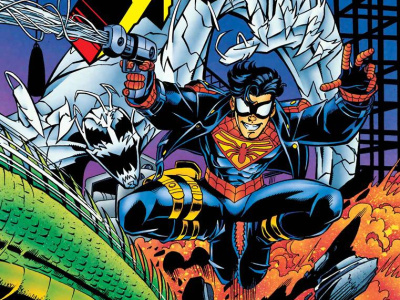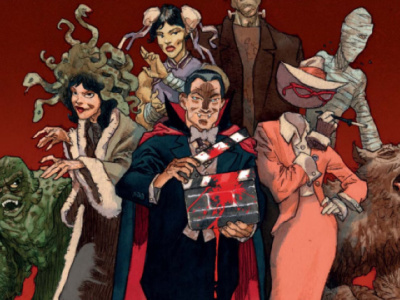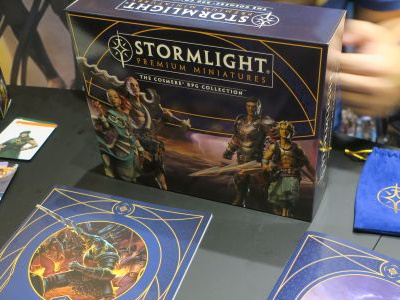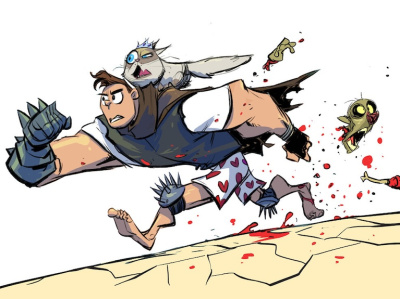We interviewed Wizards of the Coast Vice President of Digital Games Randy Buehler about the company's new Gleemax initiative (see 'Gleemax: WotC's New Online Initiative'). In Part 1 of this three part interview, we talk about hobby gamers and the Gleemax target audience. In Part 2 of this three part interview, we talk about the Gleemax business model (see 'Interview with Randy Buehler, Part 2'). In Part 3, we talk about how Gleemax targets new hobby gamers (see 'Interview with Randy Buehler, Part 3').
You mention that you had the feeling that the hobby game audience was aging--do you have research that shows that?
Yes.
Are you talking about Magic, or Magic and D&D, or hobby games in general?
Good question. We're hitting the limits of what I'm allowed to talk about publicly. We obviously spent a lot of time studying our player base, and it's not just the Magic player base. D&D is a huge part of our business and we spent a lot of time studying trends and what we think is going on in the industry. Our research, both our internal data and our market research shows us that we're not recruiting as many teenagers as we were five years ago. I guess we're assuming that's true of the whole industry -- we make up enough of the industry that if it's true of us it might be true of everybody.
You mentioned that with Magic Online you have a thriving business in selling digital objects. Can you characterize its size?
I can tell you that we have over 300,000 accounts, and I'm not allowed to give you revenue numbers; because Hasbro is a publicly traded corporation, there are limits to what I'm allowed to say.
Can you compare the number of online accounts to the number of people you think are playing the TCG?
It's a small fraction of what we have for paper Magic. Like I said, it's a dedicated fraction, they're online playing a lot and tend to be the older portion of the crowd where they want the convenience of online play rather than the social nature of face to face play.
Does that mean players tend to age from TCGs into online play?
We think that's what's going on with Magic, yes. Initially we were a little concerned, we didn't want to cook the golden goose, we didn't want Magic Online to hurt our paper business and we took a long look at that to make sure we weren't doing any damage to the paper business. We're very happy with the way it's worked out, we don't think we're doing much cannibalization of the paper business and it's exactly for the reason you described, it seems that what happens is people get into the paper game and then as their life becomes more complicated, they age into Magic Online and that's a customer who wouldn't have been playing Magic at all if it wasn't for Magic Online. We wind up keeping people in the game, keeping the community bigger. I'm not going to argue that it's a net positive for the hobby industry, but I don't think it's a negative and it might be a positive because those players will occasionally go out to a Friday Night Magic or a draft.
You talked about the need to recruit younger players into gaming. If the online play has been a place where more mature gamers go, how does the online initiative recruit new gamers?
I think that's a Magic-specific thing. Because Magic is such a complicated game, I don't think Magic Online is the best computer game for a 15 year old to play. Because it's trying to replicate the paper Magic experience, Magic is a complicated game, and you've got the game constantly asking you if you want to do anything right now. I think we can do a better job of making Magic Online a friendly experience for someone who's brand new to Magic in general. The truth of Magic Online is it has extended the life of people within the Magic brand. I don't think that means digital hobby games are inherently unfriendly to new players. I just think Magic Online specifically is not the first thing you want to show somebody about the hobby game industry. I think you want to show them a board game, or a simpler TCG, or you want to introduce them to people first and foremost.
That's the strategy we have. If we get the community right, if we can introduce people to other people, that's how we get people into the hobby industry, it's because some friend of theirs is hand teaching them. I think that'll be good for Magic Online too, because the way most people learn Magic is they're hand taught. You need a friend first, and the friend teaches you. Magic Online would be a lot easier if someone you met online taught you how to play, somebody that you met in the social networking space, got to know sort of thing.
When you were talking about the audience for Gleemax, you described a Magic player and you also said you wanted to serve the online strategy gaming community, so are you talking about the community of online gamers or the online community of hobby gamers?
Our first target is tabletop gamers, and not just Magic gamers, but tabletop gamers and all that construes. I wasn't trying to describe a Magic player; I was describing a WotC player. Step number one for us is to create a set of tools that existing tabletop gamers will like and use. Step number two is a network of gamers, people hanging out, talking about games, what they want to play -- whether it's our stuff or somebody else's stuff. Then at that point it sets us up to go recruit the next generation, try to go off the site with marketing campaigns, get high school kids to come to the site and then hopefully they'll get drawn into the culture. That's the way it's always worked for years, we're just moving it out of the hobby store and online. We're supplementing that hobby store experience with our online experience.
Tabletop gamers are the first customers we care about. The second customer we care about is online strategy gamers. That's the guy who is playing Civilization, or maybe he's playing Halo because he doesn't know any better, if only we could introduce him to the tabletop experiences, he'd rather be a hobby gamer. I don't know what the word is to refer to online strategy gamers plus tabletop gamers. I've been using hobby gamers to try and capture all that, but I'm not sure we have the right word that would cover the whole audience yet.
Is this going to blow up and target mainstream gamers? I'm not going to be upset if that happens. We're not trying to recruit Halo players and first person shooters, but if that group decides this is a set of tools they're happy with and they want to move into the space, I'm not going to complain, I think that there are gamers of all different shapes and sizes that might move into Gleemax, but our point in making the site and our primary customer target is tabletop gamers plus online strategy gamers.
Click here for Part 2.
On Hobby Gamers and the Gleemax Target Audience
Posted by ICv2 on June 10, 2007 @ 11:00 pm CT
MORE NEWS
Part of 1996 Marvel/DC Crossover
August 1, 2025
Writer Karl Kesel and artist Mike Wieringo are the creative team for the one-shot comic, which was first published in 1996 in the middle of a Marvel/DC crossover.
In 'Dracula vs. Hitler'; New RPG Just Unveiled by Devir Games
August 1, 2025
Devir Games unveiled Dracula vs. Hitler , a new RPG, that will be heading to BackerKit.
MORE GAMES
For 'Cosmere RPG'
August 1, 2025
Brotherwise Games previewed their Stormlight Premium Miniatures Collection, for Cosmere RPG.
Crowdfunding Campaign Launches in October, Followed by Retail Release
August 1, 2025
Vault will crowdfund the graphic novel on the Backerkit platform in October, then release it to retail.







